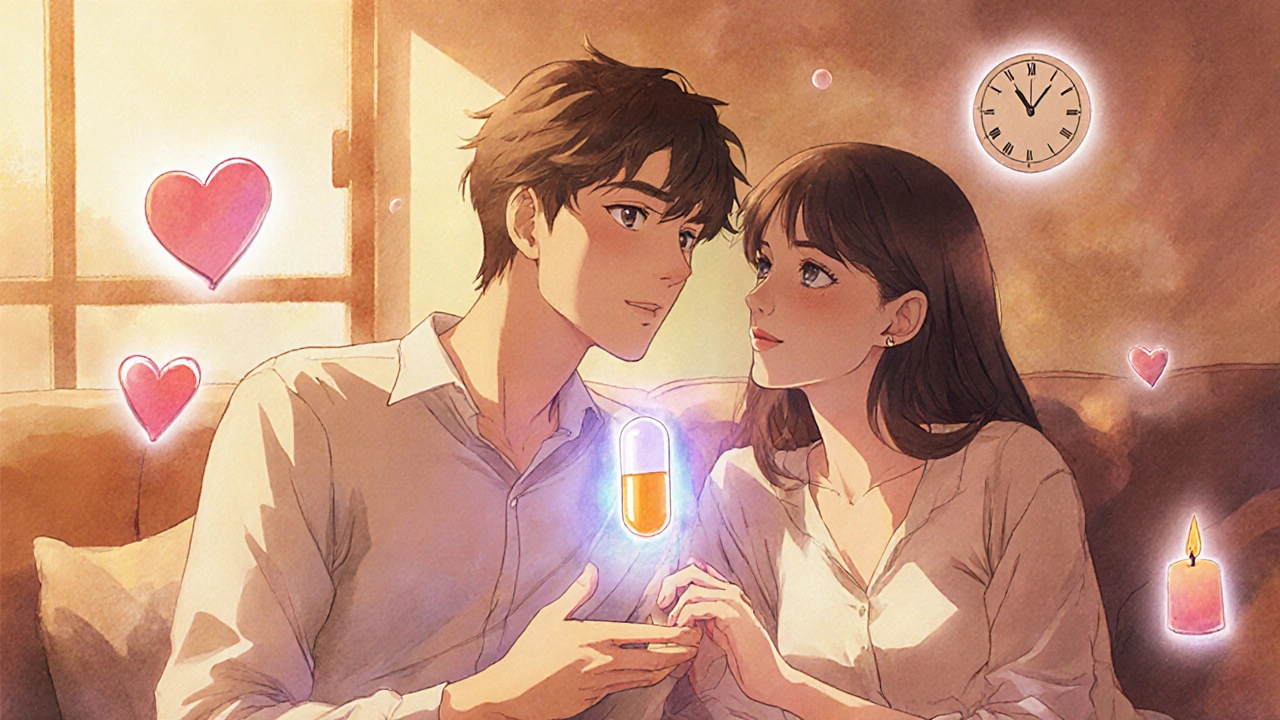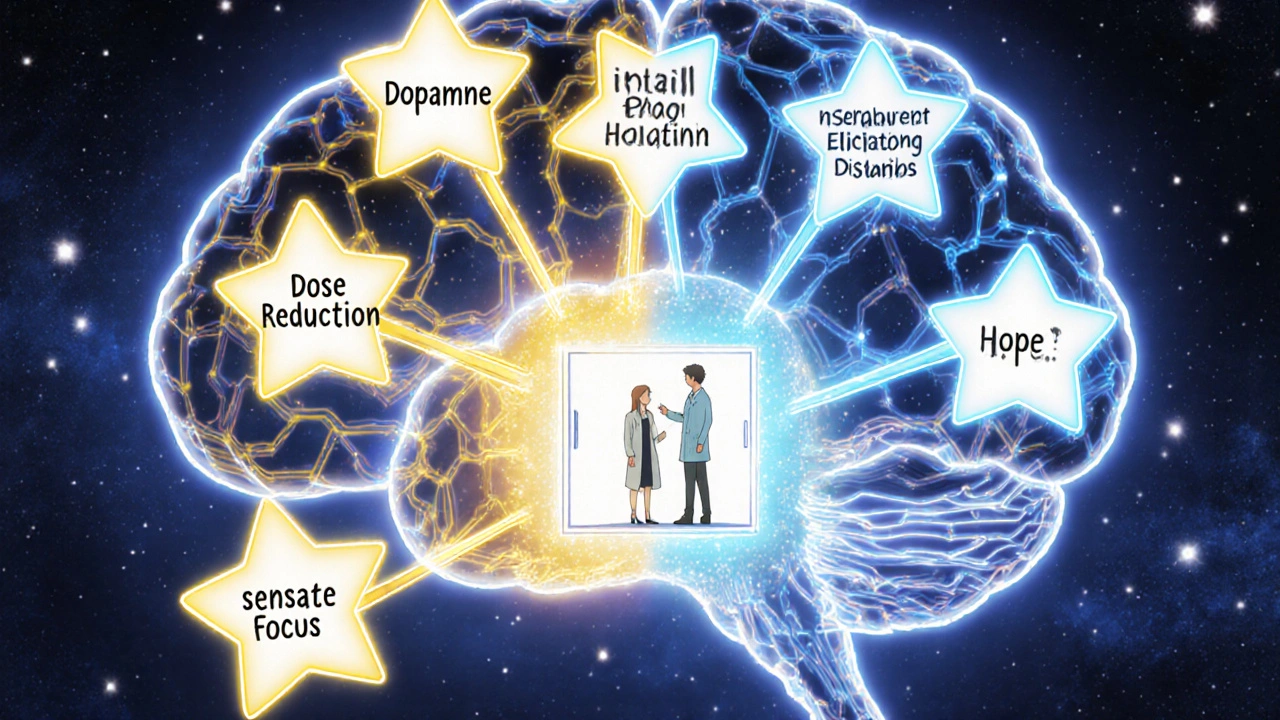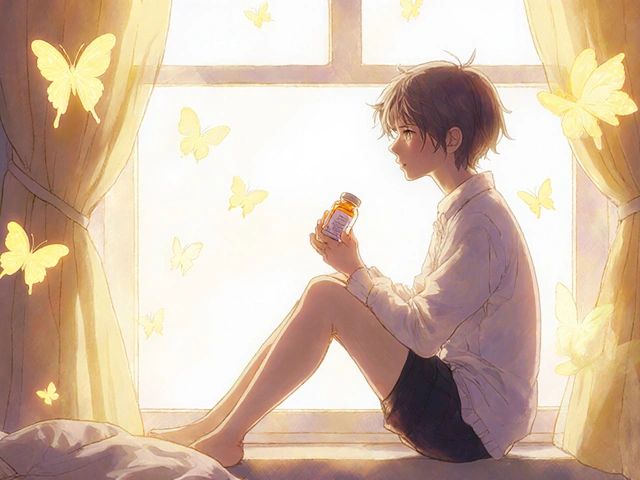SSRI Sexual Dysfunction Management Tool
Get Personalized Recommendations
Your Personalized Recommendations
1. Dose Reduction
2. Adding Bupropion
3. Switching Medications
4. Behavioral Strategies
Important: These recommendations are based on current medical evidence and should be discussed with your healthcare provider before implementation.
When you start an SSRI for depression, you expect to feel better. But for many, the relief comes with a hidden cost: sexual dysfunction. It’s not rare. Between 35% and 70% of people taking SSRIs report problems like low desire, trouble reaching orgasm, or erectile issues. These side effects don’t show up overnight-they often creep in within the first few weeks. And for some, they’re worse than the depression itself. The worst part? Many doctors never bring it up. A 2023 Harvard Health poll found 73% of patients were never warned about this risk before starting treatment. That leaves people feeling confused, ashamed, or alone. But you don’t have to stay stuck. There are real, evidence-backed ways to fix this without giving up your antidepressant.
Why SSRIs Cause Sexual Problems
SSRIs work by boosting serotonin in the brain. That helps lift mood. But serotonin doesn’t just affect emotions-it also shuts down sexual response pathways. Too much of it dampens arousal, delays orgasm, and kills desire. It’s not about being ‘less interested’ in sex. It’s about your body’s ability to respond. The problem hits different for different people. For men, it’s often trouble getting or keeping an erection. For women, it’s reduced lubrication or numbness during touch. For both, the most common complaint is a flat, muted orgasm-or no orgasm at all. This isn’t psychological. It’s pharmacological. And it’s not something you can just ‘get over’ by trying harder.Dose Reduction: The Simplest First Step
Before jumping to switches or add-ons, try lowering your dose. Many people don’t realize SSRIs can still work at lower levels. Studies show cutting your dose by 25-50% improves sexual function in 40-60% of cases without losing antidepressant benefits-especially if your depression is mild to moderate. For example, if you’re on 40mg of sertraline, try 20-30mg for 2-4 weeks. Track your symptoms. If your mood stays stable and your sex life improves, you’ve found a sweet spot. This approach works best with shorter-acting SSRIs like sertraline or citalopram. Fluoxetine? Not so much. Its half-life is over two weeks, so small dose changes won’t make a quick difference.Drug Holidays: Timing Matters
A drug holiday means skipping your SSRI for 48-72 hours before planned sexual activity. It’s not for everyone. But for those on SSRIs with short half-lives-sertraline, escitalopram, citalopram-it can be very effective. One study of 30 patients found it helped restore orgasm in 60-70% of cases. But here’s the catch: you can’t do this with fluoxetine. It sticks around too long. And even with the right drug, there’s a 15-20% risk of withdrawal symptoms: dizziness, nausea, anxiety. Only try this if you’ve been stable for at least 4-6 weeks and under your doctor’s supervision. Don’t just skip doses randomly. Plan it. Track it. And never do this if you’re at risk of relapse.Switching Antidepressants: The Strategic Move
If dose tweaks and holidays don’t help, switching is next. Not all antidepressants are equal when it comes to sex. Among SSRIs, paroxetine is the worst offender. Sertraline and escitalopram are better. But the real game-changer is bupropion. Unlike SSRIs, it boosts dopamine and norepinephrine-not serotonin. That means it doesn’t kill libido. In fact, switching from an SSRI to bupropion improves sexual function in 60-70% of cases. The downside? It can trigger anxiety or insomnia in some. And if you have severe depression, switching carries a higher relapse risk-25-30% versus 10-15% if you stay on your SSRI. Mirtazapine and nefazodone are other options. They block certain serotonin receptors and help sexual function in about half of users. But they cause drowsiness in 30-40% of people. So weigh the trade-offs: better sex versus feeling tired all day.
Adding Bupropion: The Most Proven Adjunct
You don’t have to quit your SSRI. You can add bupropion to it. This is the most studied and effective solution. In a double-blind trial of 55 people on SSRIs, adding daily bupropion (150mg twice a day) improved sexual desire and frequency in 66% of cases. As-needed bupropion (75mg taken 1-2 hours before sex) helped 38%. That’s still good-but daily dosing wins. The catch? About 20-25% of people get more anxiety, especially if they’re on fluoxetine. Start low: 75mg once daily for three days, then increase to 75mg twice daily. Wait four weeks to see full effects. Don’t rush it. And if you feel jittery or panicky, talk to your doctor. This isn’t a magic bullet-but it’s the closest thing we have.Other Adjuncts: What Else Works
Bupropion isn’t the only option. Buspirone, a mild anti-anxiety drug, acts on serotonin receptors in a way that can improve sexual function. Taken daily at 5-15mg, it helps 45-55% of users. It’s safe, with only 5-10% stopping due to side effects. But it takes 2-3 weeks to kick in. Cyproheptadine, an old antihistamine, blocks serotonin too. At 2-4mg as needed, it helps about half of users. But it causes drowsiness in 35-40%. Dopaminergic drugs like ropinirole (0.25-1mg daily) or amantadine (100mg daily) can work fast-within 48 hours. But they carry risks: tremors, anxiety, or worsening depression, especially with fluoxetine. These are second-line options. Use them only if other methods fail and under close supervision.Behavioral Strategies: No Pills Needed
Medication isn’t the only path. Some people find relief by changing how they experience sex. Experts like Dr. Levine suggest ‘overriding the dampening effect’ with more intense stimulation. That could mean trying new positions, incorporating toys, or focusing on non-penetrative pleasure. Couples who use ‘sensate focus’-a therapy where partners take turns touching without pressure to perform-see 50% improvement in satisfaction, even while staying on SSRIs. The key? Reduce performance anxiety. Make sex about connection, not outcome. Schedule time. Remove distractions. Talk openly. Sometimes, the fix isn’t in a pill-it’s in a conversation.
What About Persistent Sexual Dysfunction?
There’s a scary rumor: some people say their sexual problems last long after they stop SSRIs. The Therapeutic Goods Administration (TGA) issued a warning in June 2023 about this. Case reports describe symptoms lasting months-or years. But here’s the truth: the evidence is thin. A 2023 review of 19 studies found only six met basic quality standards. It’s possible. But we can’t say how common it is. If you’re worried, track your symptoms before, during, and after treatment. Don’t panic. But do be aware. If symptoms persist beyond 3-6 months after stopping, see a specialist. This is rare-but real.What’s New on the Horizon
The future looks promising. New antidepressants like vilazodone and vortioxetine have 25-30% lower rates of sexual side effects. But they cost 45 times more than generic sertraline. That’s not affordable for most. Meanwhile, a new drug called MK-0941, a 5-HT2C blocker, showed 70% improvement in sexual function in a 2023 trial-without hurting mood. It’s still in phase II, but it’s a sign that better options are coming. For now, we work with what we have.How to Start
Here’s your action plan:- Track your symptoms using a simple scale: 1-10 for desire, arousal, orgasm, and satisfaction.
- At your next appointment, say: ‘I’m having sexual side effects from my SSRI. What can we do?’
- Ask if dose reduction is possible.
- If that doesn’t help, ask about adding bupropion.
- Don’t accept ‘it’s just a side effect’ as an answer.
Can I just stop my SSRI if sex is a problem?
No. Stopping abruptly can cause withdrawal symptoms like dizziness, nausea, brain zaps, or even a return of depression. Always work with your doctor. If you want to stop, they can help you taper slowly. Never quit on your own.
Does bupropion help with depression too?
Yes. Bupropion is an antidepressant on its own. It’s often used for depression, especially when low energy or low libido are major symptoms. When added to an SSRI, it doesn’t just fix sex-it can also boost motivation and focus.
How long does it take for bupropion to help with sexual side effects?
Daily bupropion usually takes 2-4 weeks to show full effects. As-needed use (75mg before sex) can work within 1-2 hours, but it’s less consistent. Stick with daily dosing if you want lasting improvement.
Are there any SSRIs that don’t cause sexual side effects?
No SSRI is completely free of sexual side effects. But sertraline and escitalopram have lower rates than paroxetine or fluoxetine. Newer options like vortioxetine and vilazodone also cause fewer issues-but they’re much more expensive.
Should I talk to my partner about this?
Yes. Open communication reduces shame and builds support. Many partners don’t realize the issue is medication-related, not personal. Explaining that this is a side effect-not a lack of attraction-can strengthen your relationship and make finding solutions easier.
Is this problem permanent?
For most people, sexual function returns within weeks after stopping the SSRI. But a small number report symptoms lasting months or longer. The risk is low, but real. If problems persist beyond 6 months after stopping, see a specialist in sexual medicine.


joe balak
November 2, 2025 AT 16:13So SSRIs kill libido by flooding the brain with serotonin but bupropion fixes it by boosting dopamine? That’s wild. I always thought it was just in your head. Turns out my brain’s just wired wrong and the meds are the culprit. No wonder I felt like a zombie in bed.
Sonia Festa
November 3, 2025 AT 21:29bro i took sertraline for 3 years and my sex life turned into a ghost story. no spark, no zing, just... silence. tried dropping to 25mg and boom - suddenly i remembered what a moan sounded like. also my cat started judging me less. small wins.
Ryan Tanner
November 5, 2025 AT 09:58Just want to say this is one of the most helpful posts i’ve read in months. seriously. i’ve been too ashamed to talk about this with my doc. now i’m printing this out and taking it to my next appointment. thank you.
Iván Maceda
November 6, 2025 AT 13:50👏👏👏
Michelle Lyons
November 8, 2025 AT 01:48They don’t want you to know this but SSRIs are part of the pharmaceutical mind control program. They lower your libido so you don’t reproduce. Think about it - why else would every major drug company push the same side effect? They want a population that’s docile, distracted, and celibate. The government knows. The FDA knows. They just won’t tell you.
Amina Kmiha
November 8, 2025 AT 20:35OMG YES 😭 I’ve been on escitalopram for 5 years and I haven’t had an orgasm since 2021. My husband thinks I’m cheating. I can’t even look at porn anymore without crying. I tried bupropion and it made me feel like a raccoon on a treadmill. But I’m still here. Still trying. Still alive.
Cornelle Camberos
November 10, 2025 AT 09:33While the empirical data presented herein is methodologically sound, one must consider the broader sociopolitical implications of pharmacological modulation of human sexuality. The normalization of SSRI-induced anhedonia as an acceptable trade-off reflects a systemic devaluation of embodied pleasure in favor of chemical compliance. This is not medicine - it is behavioral pacification disguised as therapeutic intervention.
Jessica Adelle
November 10, 2025 AT 19:18It is deeply irresponsible to suggest that individuals should adjust their antidepressant dosages without physician supervision. This is not a DIY project. People die from abrupt discontinuation. You are not helping. You are endangering lives.
Sara Allen
November 10, 2025 AT 21:33i dont get why ppl are so into this whole ‘sex thing’ anyway? like why are we even talking about this? just take your meds and be happy. i mean, if you cant cum then maybe you just need to chill the f*ck out and stop being so dramatic. also i think its weird that you all think your brain is broken when its just your life choices. maybe you need a better boyfriend.
John Rendek
November 12, 2025 AT 08:19Don’t let anyone make you feel bad for wanting to feel whole again. You’re not broken. You’re medicated. And there’s nothing wrong with asking for better. Keep pushing. You’re not alone.
Vrinda Bali
November 13, 2025 AT 19:58Do you realize that Big Pharma is using SSRIs to suppress the reproductive instincts of the masses? This is not coincidence. The same corporations that sell antidepressants also own the fertility clinics. They profit from your dysfunction. They profit from your silence. They profit from your children never being born. The data is there - if you dare to look beyond the glossy brochures and FDA-approved lies.